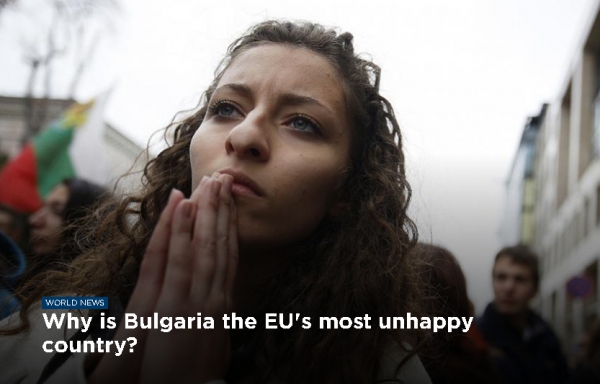Bulgaria is by far the most unhappy country in the EU, a newly-released survey has found.
The former communist country, which joined the European Union in 2007, came bottom of a Brussels poll on life satisfaction.
Bulgarians averaged just 4.8 on a zero-to-10 scale of happiness, some distance behind Portugal, the next most miserable with 6.2.
The survey, published to coincide with International Day of Happiness on March 20, revealed Scandinavia was the most satisfied in the EU, with an average of 8/10.
Bulgaria has the lowest GDP in the EU and its unemployment rate is 10.8 percent, above the bloc’s 9.8 percent average. The average annual wage in Bulgaria was 1,949 euros in 2013 – the lowest in the EU. The country saw rapid growth between 2004-2008, but was hard hit by the economic crisis.
But Dimitar Bechev, an expert on south-east Europe from the London School of Economics, suggested Bulgaria’s misery was more nuanced than simply money.
“Joining the EU has not made Bulgarians happy,” he said. “It’s seen as a necessary evil and perhaps expectations were higher, they thought it was the silver bullet.
“Bulgarians saw their own government as problematic and Europe as the solution. But since the economic crisis that’s changed, they can’t trust anyone. There’s an underlying nature in Bulgarian people and society – not to trust anyone.
“You see some green shoots [of positivity]. There’s been lots of civic activism over the last few years, a protest movement.
“People have been calling for rule of law and more transparency in government. And for not just box-ticking for Brussels, but actually doing it for yourself.
“But that’s long-term, it doesn’t happen overnight. But if it does happen – more democracy, more transparency, more accountability – then over time the amount of people saying things are going in the right direction will increase. But we’re not there yet, as this survey shows.”
Bulgarian Elena Georgieva (@ElleGeorgieva), 33, working as a PR consultant in the UK, said emigration had split up families, playing a part in the unhappiness.
She added: “I am not surprised that Bulgarians are the least happy people in Europe and I think there are several elements to this. Naturally we Bulgarians have more negative outlook to life, we don’t tend to smile a lot even when we are happy.
“Since the fall of the old communist regime many Bulgarians have lived and keep living in poverty and this has taken its toll. Bulgarians are simple people, most of us aren’t interested in having loads of money or going on a fancy holiday to an exotic place. We want to have enough to live a normal life. Now days people are constantly worried about their jobs, whether they have enough money to pay the bills or put food on the table. In some cases, especially for elderly people, they have to choose between paying for their medicines or heating the house in the winter.”
Ivaïlo Ditchev, a Bulgarian researcher from the University of Sofia, responding to another survey by the UN that ranked the country one of the world’s least happy, said: “A significant factor is that happiness is not a state of being but a process. We are not happy if we are not evolving. It is like riding a bicycle: if the pedals don’t turn, you fall over. You have to move forward, to overcome obstacles. Happy societies are those with a goal, a plan.
“We have been without direction for some time now. Perhaps this is due to the ageing population. Nonetheless, it is clear that we no longer know where the country is headed.
“Another factor is the definition of happiness: it is a feeling of belonging. We must feel that we are part of a community; that we are appreciated. This may be why the Scandinavian countries, with their highly-developed welfare states, are ranked at the top of the index.”
Source (20/03/2015) : www.euronews.com




